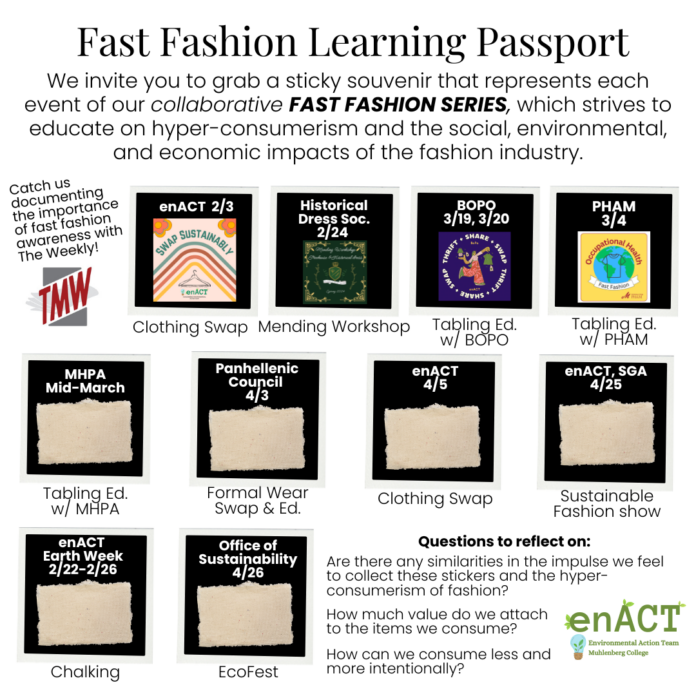To Muhlenberg Weekly readers,
Welcome back to the Fast Fashion Series, a multidisciplinary initiative brought to you by enACT to raise awareness of the global impacts of fast fashion on human health/wellness and natural ecosystems. Our first two events, which occurred last month, focused on clothing production and illustrated the lifecycle of clothing, something that we as consumers don’t always think about. The fast fashion mapping activity, featured at enACT’s last clothing swap, is something that will be continued throughout the semester. This event concretely illustrated the global footprint in terms of carbon emissions and the potential social and ethical impacts clothing has before it enters our hands. In the activity, students were asked to pinpoint exactly where their clothing items were made by checking their tags.
The mending and embroidery workshop hosted by the Historical Dress Society provided a communal space to be part of one of the many solutions to fast fashion–mending holes to extend the lifetime of clothing and support students in consuming consciously. Ella Rolin ‘25, who led this event, feels that “consumers often think… that clothing should be replaced as soon as something small goes wrong.” This leads the industry to be the second most polluting in the world. Teaching people mending skills is a great way to develop an appreciation for clothing creation, emphasize the value in personalizing your wardrobes and reduce textile and fashion waste.
The Body Positive club (BoPo) will be tabling after spring break to “focus on the accessibility of sustainable fashion.” According to Anna Weiss ‘26, the educational resources and tips shared will “support people of all body types and financial situations in shopping sustainably.” Sustainable fashion can feel out of touch for many, and this education will showcase actionable ways that Muhlenberg students can get involved.
The story of a simple cotton t-shirt goes beyond the moment we purchase it at the store. We often don’t think about what happened before–who exactly made the t-shirt and where? Peer Health Advocates of Muhlenberg (PHAM) hosted a tabling event to highlight issues of occupational health and garment worker safety. PHAM was very excited to join in on this big collaboration project because fast fashion is an emerging issue that can impact public health globally. Occupational health in correspondence with fast fashion is an aspect that goes unnoticed and we wanted to help bring awareness to this issue. Our goal is to let students know about how buying fast fashion can affect more than just environmental issues, but also individuals who work for these companies. “Occupational health is an area within public health which usually gets overlooked and underreported. This collaboration with enAct has helped us share this area of health in correspondence with fast fashion to our campus community!” said Karly Buchanan ‘24.
Events coming up include MHPA’s Social Media Education, the Panhellenic Council’s Formalwear Swap on Apr. 3, enACT’s Clothing swap on Apr. 5 and more!
I hope that you attend the events, read these articles and support the cause! Get updates on the series by joining enACT’s email list, enact@muhlenberg.edu, or visiting our Instagram @enact.berg.
Sincerely,
Jessica Rosen
enACT co-founder and executive board member
with Anna Weiss, Karly Buchanan, Ella Rolin






















